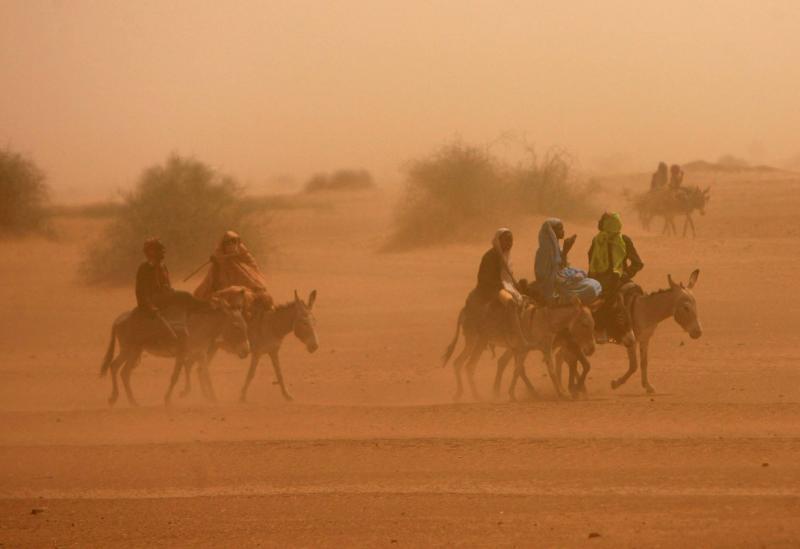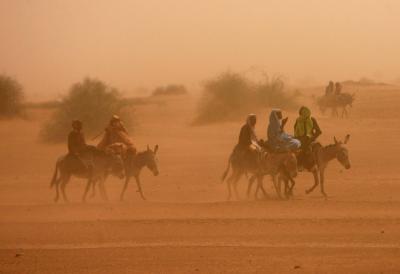Residents of the Darfur region in Sudan fear that the ongoing fighting between the army and the paramilitary Rapid Support Forces could revive the conflict in the vast desert region that has already tasted the bitterness of war for two decades. The conflict in Darfur erupted in 2003 when a group of rebels confronted government forces supported by the Janjaweed militias, who gained notoriety for horse-mounted violence that resulted in the deaths of approximately 300,000 people and the displacement of millions.
Despite numerous peace agreements, the conflict has persisted since that time, and the intensity of violence has escalated over the past two years. Violence quickly spread to Darfur after clashes between the Sudanese army and the Rapid Support Forces broke out earlier this month in Khartoum. Residents and sources reported incidents of looting, ethnic revenge attacks, and clashes between the army and Rapid Support Forces in population centers across the region, which is known for agriculture and is home to nomads, covering an area roughly equivalent to France.
Efforts for local mediation have helped ease the conflict in the main cities of Nyala and El Fasher, but bombardments and looting continued in the city of Geneina, causing residents of Darfur to fear a large resurgence of war. According to journalist and human rights activist in Nyala, Ahmed Quja, "If military leaders from influential tribes are killed, there will be chaos and there will be tribal mobilization." He expressed concern that some fighters interact with individuals based on their ethnic or tribal groups. Quja recounted, "I was looking for medicine for someone when soldiers stopped me and accused me of being from the Rapid Support Forces," pointing out that these accusations stemmed from his appearance. He stated regarding both warring parties, "If they do not reach a political settlement, they will come to Darfur."
Darfur holds strategic importance for the two warring sides in Sudan, namely the chief of the armed forces, Lieutenant General Abdel Fattah al-Burhan, and the commander of the Rapid Support Forces, Lieutenant General Mohamed Hamdan Dagalo, known as Hemeti. Both men built their careers there, with al-Burhan rising through the military ranks while fighting in Darfur, and Hemeti starting his military career leading one of the militias that fought in several battles on behalf of the Sudanese government during the conflict in the region.
While the army now attempts to drive Rapid Support Forces fighters from their positions in Khartoum, the paramilitary forces may return to their roots in Darfur in a bid to regroup and gain reinforcements.
The increase in bloodshed in Darfur could draw the attention of the United States once again. Previous outbreaks of violence and allegations of genocide led to a push for peace and significant U.S. involvement in negotiations. The likelihood of problems is compounded by the fact that Darfur borders four countries: Libya, Chad, the Central African Republic, and South Sudan, all of which are experiencing instability due to internal conflicts.
Around 1.5 million displaced people live in camps in Darfur. Waves of violence have persisted for years, with fighters launching attacks on residential communities, burning villages, and looting relief supplies. Will Carter, director of the Norwegian Refugee Council in Sudan, stated, "Regardless of how the battle is currently unfolding in Khartoum, we expect a bloodier conflict now in the Darfur region, with more armed groups, weapons, and fighting."
Sources in Geneina, near the border with Chad, reported that armed individuals mounted on horses and riding motorbikes and trucks looted areas of the city, causing fighting between the army and Rapid Support Forces to erupt. However, residents in Nyala and El Fasher noted that they managed to relatively curb violence after agreeing to deploy neutral police forces in town centers that had been abandoned by fighters who remain entrenched in their controlled areas.
Nonetheless, fighting broke out in Nyala and El Fasher, leading to fatalities, displacement, looting, and a halt in relief operations upon which many local residents depend. In El Fasher, some of the worst casualties occurred in Abu Shouk, a camp for displaced people from the fighting that took place around their villages.
Dr. Mohamed Suleiman, a physician in Nyala, commented, "Life is slowly returning to normal." He indicated that clashes had led to the destruction of the camp's market, disrupted water supplies, and prevented residents from accessing the hospital. The local population remains increasingly concerned about the potential for the war to end in Darfur, even though it originated in Khartoum.




